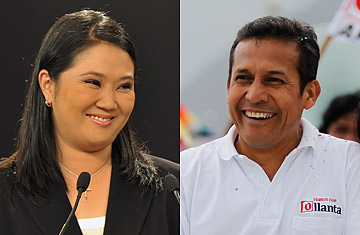
Candidates for president of Peru Keiko Fujimori (left) and Ollanta Humala
(2 of 2)
A Humala-Fujimori race seemed unlikely just a few weeks ago. Former President Toledo, 64, was in first place with a 10-point lead. He was followed by Luis Castañeda, 65, who served as mayor of the capital Lima for nearly eight years, before stepping down last September to run for the presidency.
Toledo, who had a commanding lead until March, ran what Fernando Tuesta, another pollster, says was one of the worst campaigns in recent memory. Tuesta says Toledo simply assumed he would get into the second round and grew complacent, and when the campaign realized he was slipping fast it jumped into high gear, but without a clear message. "It was the most confusing campaign," says Tuesta. Toledo ended his campaign April 7 asking "God to illuminate the hearts and minds of Peruvians," and implied that at least 80% of likely voters were in the dark about the issues. Probably not the best come-on to undecided voters.
Castañeda messed up much earlier, thinking that his eight years as mayor made him a shoo-in. No Lima mayor in modern history has gone on to win the presidency, but Castañeda thought he would change this. He began campaigning late and never connected with voters. Tuesta said he seemed to be running for mayor, which made voters turn away quickly.
Both Toledo and Castañeda lost votes to Kuczynski, 72, a economist and concert flautist. Like Humala, he shot upward in March. He has been helped by a creative new-media campaign, partly designed by his daughter, a New York Times writer, and a few of the stranger twists of presidential campaigns. One extraordinary phenomenon saw men and women trying to fondle Kuczynski's genitals during campaign walkthroughs in shantytowns — probably stemming from some obscure indigenous superstition about white people. He told reporters that he had no clue what was behind this peculiar behavior, but he did not complain. It actually may have helped soften his image and provided a "connection," so to speak, that helped overcome the inconvenient fact that Kuczynksi holds U.S. as well as Peruvian citizenship. He began the process of renouncing his U.S. citizenship late March, after other candidates harped on it. Using English, Toledo refers to him as "Mister Kuczynski," to remind voters of the U.S. connection.
Giovanna Peñaflor, who runs the IMASEN polling firm, says a potential runoff between Humala and Kuczynski could be just as polarizing. "Using the class warfare doesn't sound right, but a Humala-Kuczynski race would be framed as the poor versus the rich, with Kuczynski the candidate of the rich."
If Toledo, Castañeda and Kuczynski fail to make the runoff, Peñaflor says it will likely be because of their decision to run on platforms maintaining the country's free-market economic model, but tweaking it a little so that more of the country's economic spoils trickled down to the poor. "Toledo, Castañeda and Kuczynski made the mistake of saying that things should stay the same. This was their principal error."
As a campaign plank, maintaining the status quo may have seemed to be the way to go. Peru's gross domestic product is growing by nearly 10% and the country is winning praise from international financial institutions like the World Bank for its economic management. Poverty has dropped by nearly 10 points, exports have doubled to $35 billion in five years and President Garcia takes great pride in repeatedly telling Peruvians that the country will be among first world nations in a scant 10 years, or by 2021, when it celebrates its bicentennial.
However, says Peñaflor, average Peruvians feel that they have been cheated when they hear talk of a first-world economy while most of them have only precarious jobs — just 30% of the work force is on a payroll with benefits — and many toil at or below the monthly minimum wage of $225. She said Humala has capitalized on the discontent. He is the only candidate openly calling for the economic program to be changed. He talks about "recouping" natural resources — Peru is the world's largest silver producer, second in copper and sixth in gold — but stops short of using the word nationalization, and has unveiled a long list of programs, from free daycare to a pension for people over 65 who were never on a payroll, to boost his chances. He has pledged to raise the minimum wage on July 28, inauguration day in Peru. The message resounded with voters. Humala, says Peñaflor, is "the only one who has run with a disciplined message throughout the campaign."
Winning on Sunday, however, does not ensure a victory in the runoff. Fujimori's father came in second in 1990 and went on to win, as did Garcia in 2006. While pollsters say it is impossible to forecast the outcome in such a fluid race, they agree that the runoff will likely be the most polarizing election since the elder Fujimori came from nowhere to defeat Vargas Llosa 20 years ago.
